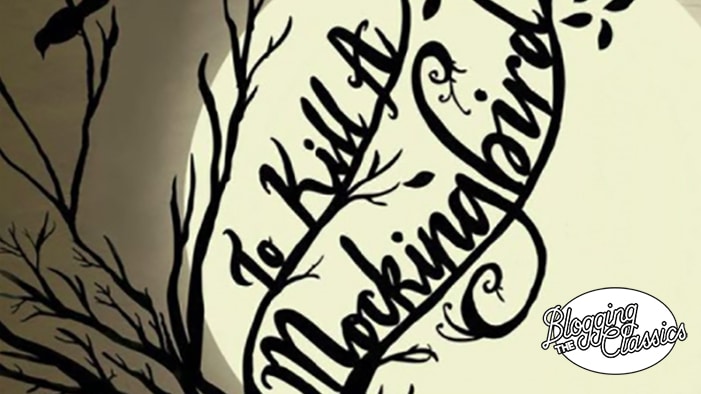Blogging To Kill a Mockingbird: Chapter 1

Hey guys! It’s been a minute since last I blogged a novel, but now I’m blogging To Kill a Mockingbird because SparkNotes is withholding my weekly paycheck of life lessons and Reese’s Pieces M&Ms until I comply. They aren’t really doing that (I’m useless without my M&Ms and they know it), but the masses have been clamoring for this (read: my mom e-mails one request to the office per week) and I’m nothing if not a people-pleaser.
Here are the rules: I take it upon myself to read the book, then I talk about it at you. That’s it, that’s the whole thing. Get yourself a copy and follow along. Or don’t. You can just read this blog and PRETEND you’ve read the book. Technically that’s a lie, sure, but I feel like it’s the kind of lie you can get away with.
I could have sworn To Kill a Mockingbird began with “Maycomb was an old town, but it was a tired old town when I first knew it.” However, this is not the case. That comes later. To Kill a Mockingbird begins instead with a brief detour into the family history of our narrator, Scout Finch. The TL;DR of it all is that Scout comes from a long line of Finches who wheeled and dealed in cotton farming.
Scout’s father Atticus was the first to break the tradition. He became a lawyer and set up shop in a little town called Maycomb. His clients were the type of people who thought a good defense was “WELL, BUT IF HE DIDN’T WANT TO BE MURDERED, HE SHOULD’VE THOUGHT ABOUT THAT BEFORE HE STOLE MY HORSE.”
When our story begins, Scout is six years old, her brother Jem is ten, and their new neighbor, Dill, is seven but looks like he’s still in utero. The three of them spend the summer Basically Just Living in the Deep American South, which is to say “climbing trees” and “being sweaty.” When they’re done doing that, they decide to bother the town recluse, a man named Boo Radley.
We know very little about Boo Radley because Scout herself knows very little about him. What we DO know is that everyone seems to regard him with both fear and curiosity, which is exactly how I feel about those new chicken nuggets Taco Bell is peddling to the unlettered masses. (They’re calling them “Naked Chicken Chips.” What am I supposed to do with that?)
Boo never leaves the house. Not to their knowledge, anyway. Rumor has it he sneaks out at night and does things like EGGING PEOPLE’S HOUSES and MOVING THEIR LAWN GNOMES. (The examples Scout gives are “peeping in windows” and “mutilating people’s pets,” but I think mine are more fun and accessible.) Boo is so mysterious, in fact, that it borders on otherworldly. Scout says, “When people’s azaleas froze in a cold snap, it was because he had breathed on them.” Jem says he’s six-and-a-half feet tall and dines on raw squirrels. This is the enigmatic, vaguely sinister persona I am hoping to cultivate as I age.
Scout tells us Boo was a troublemaker in his youth. His father, Mr. Radley, shut Boo up to stop him from disgracing the family. The story goes that one day, Boo stabbed his dad in the leg with a pair of scissors. So what we’re dealing with here is a guy who is at best deeply troubled, and at worst violently deranged. “You know what we should do?” Dill says, presumably. “SPEND ALL SUMMER HARASSING HIM.”
Dill, who is an audacious little hellion, dares Jem to go touch the Radleys’ front door. Jem deliberates for three days and then does it without consequence. Boo does not come tearing out of the house with a wraith-like fury, sprouting black wings. The darkness does not consume them, and nobody falls into a hell portal, which is disappointing, sure, but don’t worry—we’ve got a whole lot of book left.
NOTABLE QUOTES
There was no hurry, for there was nowhere to go, nothing to buy and no money to buy it with, nothing to see outside the boundaries of Maycomb County. But it was a time of vague optimism for some of the people: Maycomb County had recently been told that it had nothing to fear but fear itself.
THIS AND THAT
- The story takes place in 1933, as evidenced by the above allusion to FDR’s Inaugural Address
- Dill’s character is said to have been based on Harper Lee’s childhood friend, fellow author Truman Capote
- Jem and Scout’s mother died when Scout was two; Atticus raises the kids with the help of Calpurnia, their cook
DISCUSSION QUESTIONS
Here’s something I’m curious about. Scout is telling this story as an adult, though from the perspective of her six-year-old self, prompted by an argument she had with Jem when she was thirteen. I can’t remember if I found that confusing the first time I read this. Did anyone else?
Looking for the rest of our Blogging the Classics series? Check it out here!













